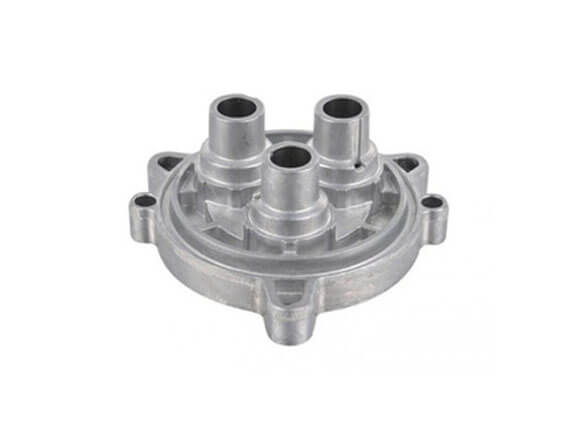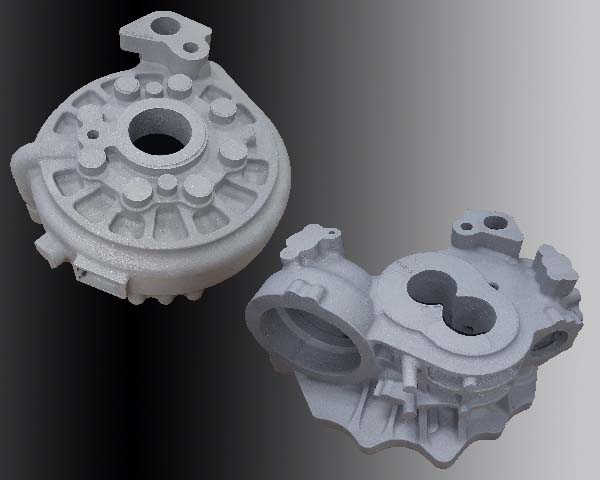Aluminum Foundry solutions designed for excellence in production
The Influence of Cutting-edge Foundry Solutions on Lasting Production Practices
Ingenious shop solutions play a vital duty beforehand sustainable production practices. By integrating recycling innovations and energy-efficient processes, these services significantly decrease environmental effect. Factories can redeem beneficial products, therefore reducing dependancy on virgin sources. As automation and lean production concepts obtain grip, manufacturing efficiency is optimized. The full extent of these advancements and their implications for the future of making stay to be checked out.
The Role of Advanced Recycling Technologies in Foundries
Advanced recycling technologies are changing the landscape of shops by improving product recuperation and lowering waste. These cutting-edge procedures enable foundries to reclaim useful metals and materials from scrap, minimizing dependence on virgin resources. By integrating innovative sorting, shredding, and melting techniques, foundries can successfully draw out usable products from thrown out products, thus promoting a round economic climate.
Moreover, these innovations sustain the production of high-quality alloys and components, guaranteeing that recycled materials fulfill rigid market criteria (Precision aluminum casting). Consequently, factories are not just improving their product effectiveness but likewise lowering the environmental influence connected with traditional manufacturing methods
This shift in the direction of advanced recycling not just reinforces financial feasibility for foundries however additionally aligns with international sustainability objectives. Eventually, the unification of these innovations stands for a substantial step ahead in the pursuit for lasting manufacturing methods within the shop sector.
Energy Performance: Minimizing Usage in Production Processes
Energy efficiency in producing procedures is critical for lasting procedures. Strategies such as procedure optimization strategies, renewable resource integration, and waste warm recuperation play essential functions in lessening power intake. By concentrating on these locations, manufacturers can considerably decrease their environmental effect while improving efficiency.
Process Optimization Techniques
A considerable variety of manufacturing centers are progressively embracing process optimization strategies to enhance energy efficiency and reduce consumption. These strategies entail assessing and improving production process, determining bottlenecks, and executing automation to improve operations. By leveraging information analytics, makers can check power usage in real-time, enabling proactive changes to decrease waste. Techniques such as Lean Manufacturing and Six Sigma concentrate on optimizing and getting rid of ineffectiveness resource appropriation. Furthermore, advanced technologies like Net of Points (IoT) sensing units supply insights right into devices performance, facilitating anticipating maintenance that prevents power loss. Generally, these process optimization approaches not only add to decreased energy usage but additionally promote a society of continuous renovation within producing environments, straightening operational techniques with sustainability goals.
Renewable Energy Integration
Lots of manufacturing centers are increasingly incorporating renewable energy sources to improve total energy performance and reduce dependence on conventional power grids. This change includes the fostering of solar, wind, and biomass power, which can significantly lower and lower functional prices carbon footprints. By using these sustainable energy resources, manufacturers not only decrease their environmental effect but also improve energy resilience. Additionally, integrating renewable resource systems frequently entails sophisticated innovations such as power storage space and smart grid services, which maximize energy usage and promote real-time monitoring. This combination sustains suppliers in achieving regulatory compliance and meeting sustainability objectives while cultivating technology in production processes. Eventually, sustainable power assimilation stands for a crucial change towards more sustainable manufacturing practices and long-lasting practicality.
Waste Heat Recovery
Integrating renewable energy sources establishes the phase for more improvements in energy effectiveness, especially with the implementation of waste heat recovery systems. These systems capture excess thermal energy generated throughout making procedures, which would otherwise be lost to the environment. By repurposing this heat, shops can substantially lower their power usage, lower operational prices, and decrease their carbon impact. The recuperated heat can be made use of for numerous applications, such as home heating, power generation, or preheating raw materials. Because of this, waste warmth healing not only enhances power performance however also adds to a lasting manufacturing version. Innovative factory services that prioritize this technology are leading the way for an ecologically accountable industrial landscape, straightening earnings with environmental stewardship.
Utilizing Eco-Friendly Products in Foundry Operations
As the need for sustainable production practices expands, factories are significantly transforming to environment-friendly products to enhance their procedures. By incorporating sustainable alternatives, such as recycled steels and bio-based binders, shops can significantly lower their environmental impact. These materials usually need much less energy for handling and can minimize dangerous emissions throughout manufacturing.
The fostering of eco-friendly products not only aluminum casting lines up with governing standards but additionally meets consumer choices for greener items. Foundries are checking out ingenious choices, such as using organic additives that enhance mold and mildew top quality while remaining safe.
The change to sustainable products fosters a circular economic situation by advertising source reuse and minimizing waste. Additionally, this modification can improve the general performance of shop procedures, as environmentally friendly materials commonly show premium residential properties, bring about boosted product efficiency - aluminum casting. Eventually, the use of environment-friendly products represents an essential action toward lasting production in the shop sector

Innovations in Waste Monitoring and Decrease Techniques
The shift in the direction of green materials in factory procedures leads the way for advancements in waste management and decrease methods. Ingenious foundry solutions are progressively adopting strategies that lessen waste generation and promote recycling. Strategies such as closed-loop systems permit the reuse of materials, substantially decreasing the volume of waste generated during manufacturing procedures. Additionally, innovations in filtering and splitting up innovations enable the reliable recovery of beneficial by-products, which can be rehabilitated into the production cycle.
Moreover, the application of real-time monitoring systems supplies data-driven understandings into waste generation patterns, promoting informed decision-making to optimize source usage. Foundries are likewise discovering biowaste solutions, converting organic waste right into power or usable products, better promoting sustainability. These advancements not just add to a round economy however likewise boost the overall environmental performance of shop operations, emphasizing the sector's commitment to decreasing its environmental impact.
The Influence of Automation on Sustainable Manufacturing
While many industries objective for sustainability, automation becomes an essential element in improving sustainable production practices within foundries. By incorporating automated systems, foundries can accomplish higher effectiveness, minimize waste, and lower energy usage. Automated procedures enable for specific control over manufacturing criteria, minimizing problems and rework, which in turn saves resources.
Automation assists in the tracking of environmental effects, enabling real-time adjustments that straighten with sustainability objectives. Advanced robotics and artificial knowledge can maximize material usage, bring about significant decreases in scrap and emissions
Additionally, automated technologies advertise much safer workplace by taking care of unsafe tasks, thus improving employee wellness while guaranteeing conformity with ecological policies. Overall, the fostering of automation within factories not just enhances operations yet likewise plays a pivotal function beforehand sustainable production methods, contributing to a much more responsible commercial landscape.
Instance Researches: Successful Application of Sustainable Factory Practices
Successful application of sustainable methods in foundries can be highlighted through numerous study that highlight quantifiable outcomes and ingenious approaches. One noteworthy instance is a mid-sized foundry that embraced a closed-loop water reusing system, decreasing water intake by 40% and decreasing wastewater generation. Furthermore, this center changed to utilizing eco-friendly mold materials, which not only enhanced item top quality but likewise boosted worker safety.
One more substantial instance involved a big factory incorporating renewable power sources, such as solar panels, which offset 30% of its energy requires. This campaign not just lowered functional prices but also added to a considerable decrease in carbon exhausts.
Lastly, a foundry that carried out lean production strategies reported a 25% rise in performance, leading to less material waste and optimized production processes. These situations jointly highlight the concrete benefits and sustainability improvements possible via ingenious foundry practices.
Frequently Asked Questions
Exactly How Do Innovative Foundry Providers Add To Total Sustainability Objectives?
Ingenious factory services enhance total sustainability objectives by enhancing resource use, lowering waste, and boosting power effectiveness. These developments contribute to decrease carbon impacts and promote environmentally accountable methods within the manufacturing sector, sustaining wider sustainability initiatives.
What Are the Economic Benefits of Taking On Sustainable Factory Practices?
Taking on sustainable factory practices can reduce functional costs, enhance source effectiveness, and enhance competition. Furthermore, these practices can draw in eco-conscious customers and investors, eventually causing enhanced profitability and long-lasting economic feasibility for companies.
Exactly How Can Small Shops Execute Lasting Developments Properly?
Little shops can execute lasting developments properly by adopting energy-efficient modern technologies, optimizing source usage, training personnel on sustainable methods, collaborating with distributors for environmentally friendly products, and participating in constant renovation processes to reduce waste and emissions.
What Qualifications Exist for Lasting Foundry Workflow?

Just How Do Customer Preferences Impact Lasting Production in Foundries?
Customer choices substantially influence sustainable manufacturing in foundries by driving demand for environmentally friendly products. As consumers focus on sustainability, foundries adjust their methods, integrating greener materials and modern technologies to fulfill market assumptions and improve their affordable advantage.
By repurposing this heat, foundries can considerably lower their power usage, lower operational prices, and lessen their carbon footprint. Foundries are additionally discovering biowaste options, converting organic waste right into energy or functional materials, even more advertising sustainability. By incorporating automated systems, factories can achieve better effectiveness, decrease waste, and reduced power intake. One more significant instance included a large shop integrating renewable power sources, such as solar panels, which counter 30% of its power needs. Ingenious foundry solutions enhance total sustainability objectives by enhancing resource use, decreasing waste, and improving power efficiency.